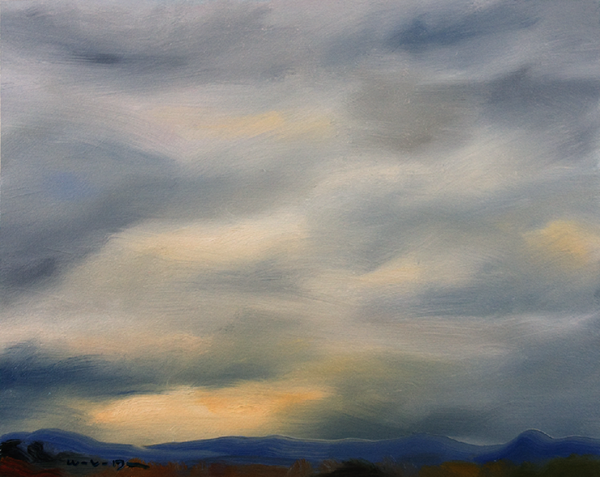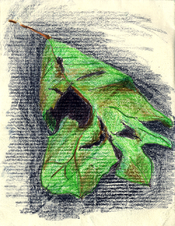Wednesday
Nov042009
Sunset, Wednesday, 4 November 2009
 William Theodore Van Doren. Sunset from Stony Point, Albemarle County, Va. Oil on watercolor block, 16 x 20.
William Theodore Van Doren. Sunset from Stony Point, Albemarle County, Va. Oil on watercolor block, 16 x 20.
During the night, the paulownia tree by the house shed its leaves. Paulownia leaves don’t change color and gently fall, their green sours, then one night they freeze stiff – big and curled – and in the morning drop nearly all at once. As the sun came up this morning I heard them hitting the ground in quick succession, clinking against each other like pieces of china.
Among them I found a perfect paulownia flower, a tightly wrapped purple bud. I had to laugh at the fellow traveler. 180° out of season, it had waited for a different way to unfurl.
Posted on  Wednesday, November 4, 2009 at 06:29PM | by
Wednesday, November 4, 2009 at 06:29PM | by  BVD | in
BVD | in  Print/Cards Available,
Print/Cards Available,  Sunset Paintings | tagged
Sunset Paintings | tagged  Blue Ridge,
Blue Ridge,  paulownia,
paulownia,  trees | | Comments Off
trees | | Comments Off
 Wednesday, November 4, 2009 at 06:29PM | by
Wednesday, November 4, 2009 at 06:29PM | by  BVD | in
BVD | in  Print/Cards Available,
Print/Cards Available,  Sunset Paintings | tagged
Sunset Paintings | tagged  Blue Ridge,
Blue Ridge,  paulownia,
paulownia,  trees | | Comments Off
trees | | Comments Off 





Coal and the Power Lines
The ominous, vaguely bituminous look of last night’s sky inspires me to add this as a note here.
Today I was happy to find, up in the branches of a black cherry tree, a few wild blackberries ready to eat, along with just-ripened black cherries. It reminded me of one of the most frequently asked questions in American life: “Would you like to try our combo today?” Finally, I was able to say yes.
But the scarcity of blackberries around here, which I have previously attributed chiefly to the land-clearing activities of crews under contract to Rappahannock Electric, also reminded me that I had just received a most unfortunate mailing from that utility.
REC urged me to call my Senators and urge them to oppose the climate change bill already passed by the U.S. House of Representatives. The bill, REC warned, might make electricity more expensive.
Well, I guess so! Any time you can’t just burn any old cheap dirty coal you want to, anywhere you want, something’s gotta give. (On the subject of coal and climate change, this article from The New Yorker is worth registering in order to read, and I believe this blog item doesn’t require signing in.)
As a customer-member (incredibly tiny minority shareholder) of the Rappahannock Electric Cooperative, I was not happy to see my money being spent in this lobbying effort. If electricity’s going to become more expensive, let’s not waste funds now on futile efforts aimed at halting human progress.
And despite the importance of coal to the economy, I thought I would register my dissent partly in the name of my grandfather, a Czechoslovakian immigrant who was a coal miner in Pennsylvania. I think working in the mines was probably not the primary cause of his very unpleasant death from throat cancer, but I doubt that it helped. I’d like to think that Grandfather Bezilla would be on my side of the climate change issue today.
After the blackberries and cherries, I saw something on my walk that made me feel a little better about this year’s aggressive land-clearing. Along the track we call the Power Line Road, growing out of the Nagasaki-like devastation, two bright green paulownia trees were shooting up like rockets – already some eight feet high, with enormous healthy leaves as big as the ear of a young elephant. Despite their rapid rate of growth, these paulownias could not come close to endangering the lines if they grew another 150 years. That may not save them when the crews come through again, but in the meantime – and regardless of how botanists may feel about them as an exotic species – their beautiful attempt to flourish is the best revenge.